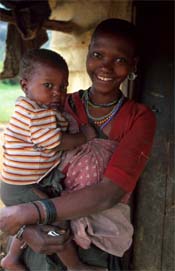 |

|
|
in Developing Countries |
| Kaiser Daily HIV/AIDS Report
 Eight foundations are expected to announce today a $50 million, five-year pilot program aimed at reducing mother-to-child HIV transmission in developing nations, the Wall Street Journal reports.
Eight foundations are expected to announce today a $50 million, five-year pilot program aimed at reducing mother-to-child HIV transmission in developing nations, the Wall Street Journal reports.
The Rockefeller Foundation, the Henry J. Kaiser Family Foundation, the Robert Wood Johnson Foundation, the United Nations Foundation, the Bill and Melinda Gates Foundation, the William and Flora Hewlett Foundation, the John D. and Catherine T. MacArthur Foundation and the David and Lucile Packard Foundation will fund the initiative, which will provide testing, drug treatment and other health care services for HIV-positive pregnant women and their newborns. A lack of programs providing the low-cost drug regimen to reduce the risk of transmission has "discouraged" HIV-positive pregnant women from seeking treatment, the Journal reports. Although fundraising has been "set back" because of the Sept. 11 attacks on the World Trade Center and the Pentagon -- the commitment of funds has declined by $10 million since the originally scheduled September announcement -- the foundations intend to raise a total of $100 million for the project. Rockefeller Foundation President Gordon Conway said that although the new fund is separate from the $1.5 billion U.N. Global Fund to Fight AIDS, Tuberculosis and Malaria, it will work in cooperation with the United Nations' fund. Columbia University's Mailman School of Public Health will administer the funds to organizations in Africa, Asia and Latin America, and part of the money will go to the United Nations Children's Fund. Experts estimate that of the 26 million pregnant women in sub-Saharan Africa this year, more than 2.5 million are HIV-positive, and without treatment, 500,000 infants may become infected (Bank, Wall Street Journal, 12/7). Young Filipinos Not Practicing Safe Sex, Study Shows
The large number of young people, "coupled with the growing acceptability of practices they adopt from their social environment, places the young at risk if they accept and initiate themselves into risky behavior," the commission said in a statement (Agence France-Presse, 12/6). "Exploring and experimenting are part of being young, but young people must consider the importance of being informed first," Osias said. According to the new report, 94% of sexually active young people said they were "not prepared" to be parents. Teen pregnancies account for 75% of maternal deaths and 17% of abortions each year in the Philippines (Teves, Associated Press, 12/6). Nigerian Sex Workers Aware of AIDS, but Unaware of Viral Transmission Routes The majority of Nigeria's 80,000 sex workers are aware of HIV/AIDS, but most do not know how it is transmitted and almost half do not take measures to protect themselves, according to a recent study by the Nigerian Society for Family Health, Agence France-Presse reports. About 60% of the 2,578 prostitutes surveyed were unaware that condoms could lower the risk of HIV transmission, and 35% thought that regular use of antibiotics could "ward off" the virus. Nigerian sex workers, who make about $130 a month -- three times the minimum wage -- see an average of four clients a day. Because higher prices are generally offered for sex without condoms, many do not take measures to protect themselves from HIV and other STDs. Of the prostitutes surveyed, 24% said they used condoms for "casual" customers, but not for "regulars" or "boyfriends," and 18% thought that they could tell if a client had HIV by looking at him before engaging in sex acts. Sex workers in northern Nigeria, where cultural and religious beliefs limit discussions about sex, knew even less about HIV transmission routes than sex workers in other parts of the country. In 1995, 35% of Nigerian sex workers were HIV-positive compared to 4.5% of the general population. Today the national HIV rate is 5.8% with an estimated 3.5 million people infected (Cunliffe-Jones, Agence France-Presse, 12/6) Nigerian Deputy Health Minister Announces Generic AIDS Drug Trials; Many Selected Centers Still Lacking Drugs Nigerian Deputy Health Minister Amina Ndalolo told reporters last week that the government intends to launch a nationwide trial of generic AIDS drugs on Dec. 10, but several of the 18 designated centers said that they have not yet received the drugs or any training on their administration, Agence France-Presse reports. The trial, which was scheduled to begin in September but was postponed, is set to begin Monday at 18 centers across the country with a "limited" number of patients. After three months, the trial, which is testing generic AIDS drugs supplied by two Indian pharmaceutical firms, will gradually be expanded to include 100 centers and 10,000 patients by the end of its first year. However, officials at two Lagos hospitals chosen to participate in the study said they had not yet received the drugs or any training in how to administer the treatments. "As I am talking to you, neither has my hospital received the drugs nor have I been told when and how to administer them," Dr. Charles Okany, head of the HIV/AIDS team at Lagos University Teaching Hospital, told Agence France-Presse. Officials at Lagos' military hospital reported similar circumstances. Mohammed Farouk, head of the Nigerian AIDS Alliance, said that people with HIV/AIDS were "fed up" with the delays and would initiate a street protest if the trial failed to start as scheduled. He said that he has seen the drugs, which are in the country, and "commended" the government for importing them (Obisesan, Agence France-Presse, 12/6). This summary is from the Kaiser Daily HIV/AIDS Report http://www.kaisernetwork.org/dailyreports/hiv) provided by http://www.kaisernetwork.org), a free health policy news summary and webcasting service of The Henry J. Kaiser Family Foundation. The Kaiser Daily Health Policy Report is published for kaisernetwork.org by National Journal Group Inc. © 2001 by National Journal Group Inc. and Kaiser Family Foundation. All rights reserved." |

© 1997-2002 BEI